'My favorite place': 100 years in the life of a Fayetteville church across from FSU
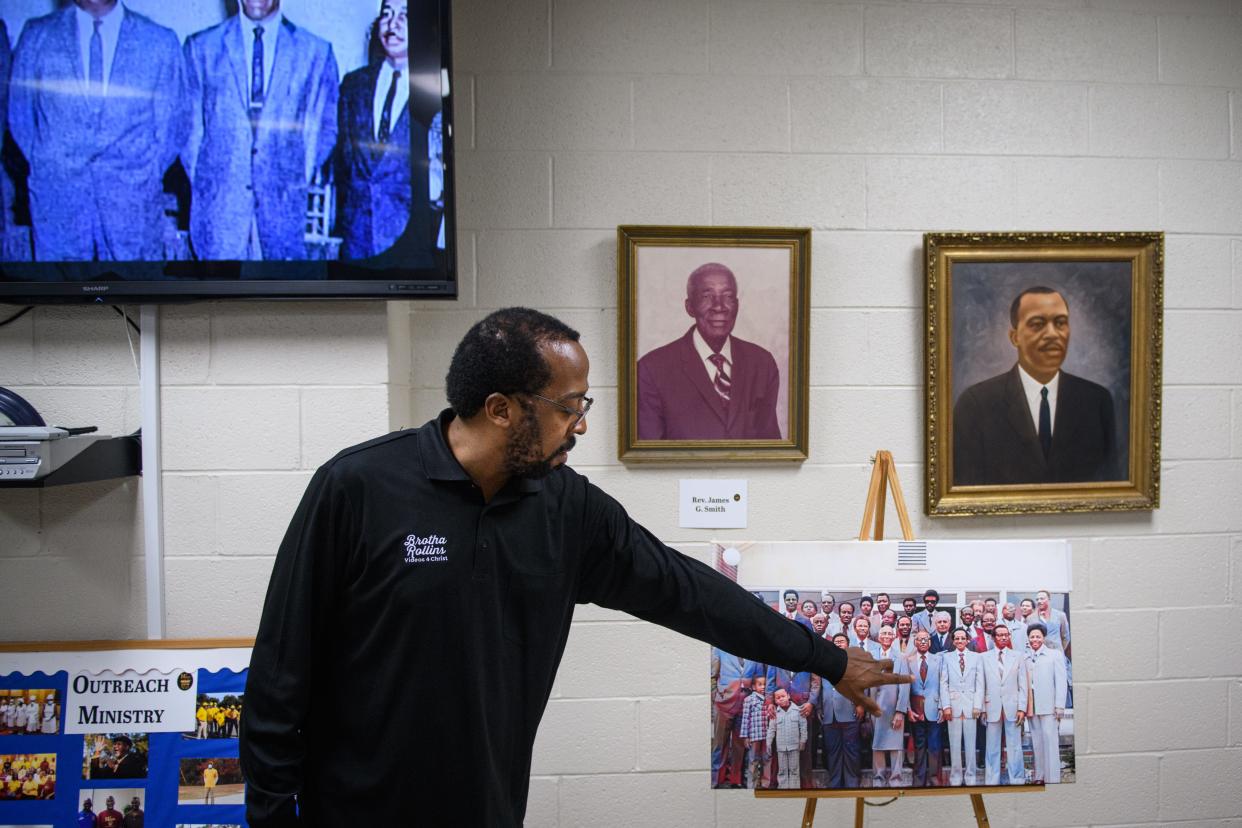
Louis Rollins cherishes his time growing up in Mt. Sinai Missionary Baptist Church on Murchison Road.
He recently chaired the committee that helped put together the museum and photo gallery on the ground floor. The museum opening coincided with the church’s 100th anniversary, which was celebrated over the summer in a service attended by generations of members who came back, from all over.
More:PHOTOS: Mt. Sinai Missionary Baptist Church’s museum
Rollins pointed out one item as his favorite in the museum — a blown-up photo on an easel that shows the men of the church. The picture predates his time at the church, but it makes him think of one of the things he likes most about Mt. Sinai.
He said the people in the picture on display were educators, community leaders, ministers — then-pastor Dr. Aaron J. Johnson called his associate ministers “Sons of Thunder.” Many went on to lead churches of their own. The future and current pastor of the church, Dr. A. Jamale Johnson, is a child in the photo.
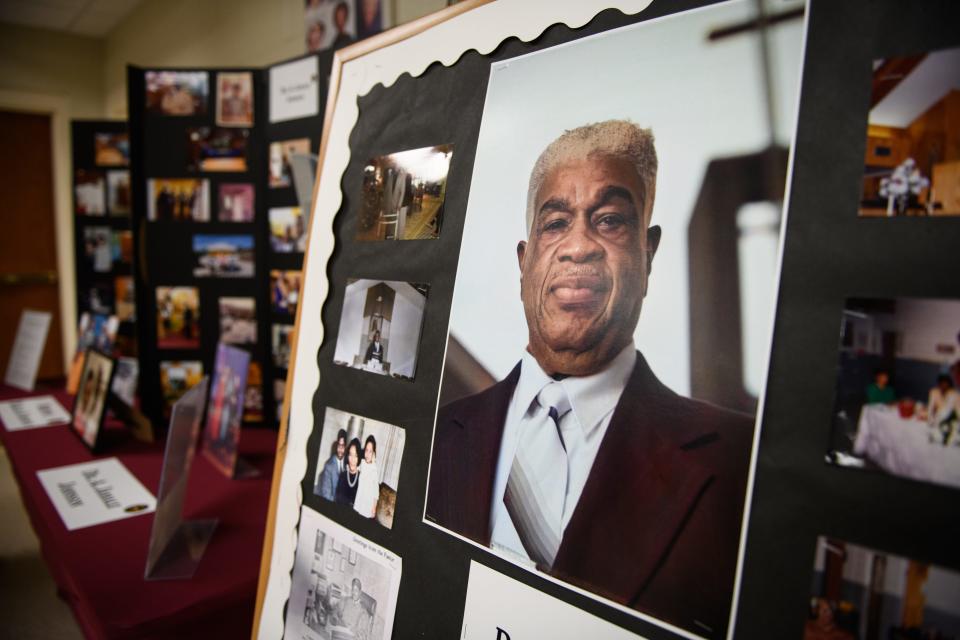
More:Whose story? Residents at forum for Fayetteville Civil War center ask questions
“What I see in this photo is strong male leadership,” Rollins says as gospel music plays in the background from speakers. “Father figures to so many people.”
The photo also reminds him of second Sundays, when he was invited to attend the men's breakfast. Expected to attend is more like it.
“The men of the church, they wanted like the young boys to come in,” he said. “They could mentor us and teach us.”
More:‘Don’t allow anyone to veto your destiny’: FSU professor’s book is guide for young Black men
In the photo, Rollins points out Deacon Charlie B. McNeill and James Alexander McNeill.
Charlie McNeill was the longest-serving deacon board chairman, Sunday school superintendent and was a carpenter at Fayetteville State University. He told students there about the church located right across Murchison Road from the campus.
“He got all the kids to come to church.”
More:Pitts: Black scholars influence Fayetteville Civil War, Reconstruction center
Johnson, the pastor, said the church already had a standing Black History Committee when it started making plans for the anniversary. A 100th anniversary History Committee was a natural step.
“They took that challenge on,” he said of the committee members, “and began to dig deep.”
The congregation embraced the effort.
“Families that were initially the founders, the early families — some of those descendants are still living and some are part of the church. Once they found out what was happening, we began to make phone calls, send emails — people (tuned) into what was happening and began to send in information.
“They wanted to make sure if it was a family, that part of history was archived.”
Young and old, together
The idea that one generation trains up the next has been a core tenant of Mt. Sinai, which is located at 1217 Murchison Road. The idea is symbolized even when it comes to the pastor: Jamale Johnson serves as 17th pastor at the church, where his father served for more than 45 years.
The elder Johnson presided over a dramatic expansion that included a new church building, an administration building and a family life center.
“Once he came in 1960, that’s when the church started to grow in mass numbers,” Rollins says.
The idea of passing the torch is exemplified by people like Dr. Annie McCullough Chavis, a retired FSU professor who is co-chair of the History Committee.
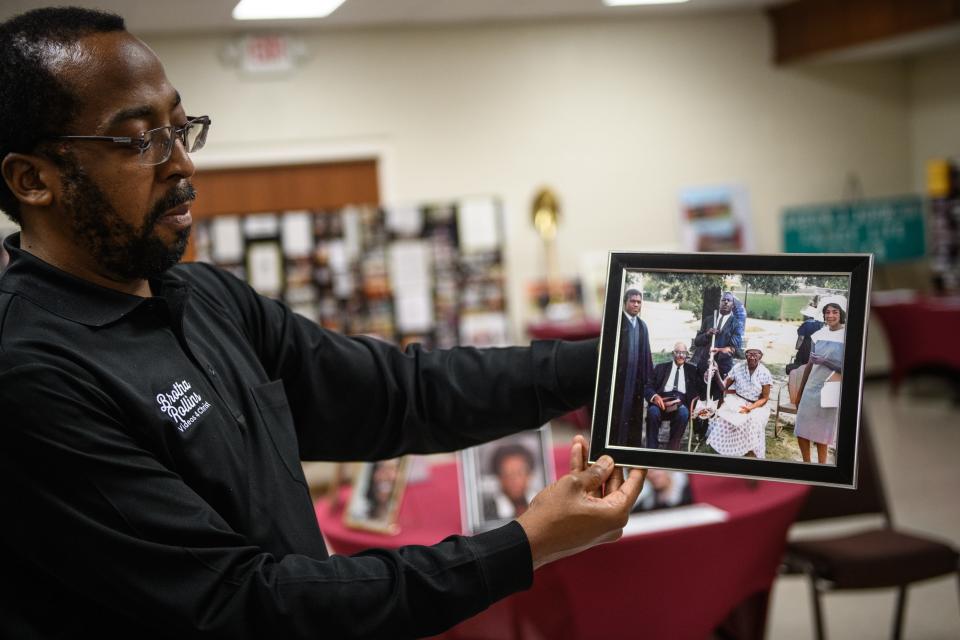
“She stressed about having the young and the old working together,” Rollins said.
The museum at Mt. Sinai is open to the public by appointment or during the hours of 12:30 and 2 p.m. Tuesday through Thursday.
It is chock full of church history, from its earliest days when it was founded off land donated by Rachel Wood and her husband, Tom, who came from Robeson County where they had a restaurant. They were originally members of First Baptist Church, then located on Franklin and Maxwell streets downtown, Rollins said.
“She had a dream that this community would have a church,” he said.
For the 100th anniversary, Mt. Sinai members were asked to bring in pictures, church bulletins and other items for the museum. It turned into a case of the bread loaves and fishes — they responded with overflow.
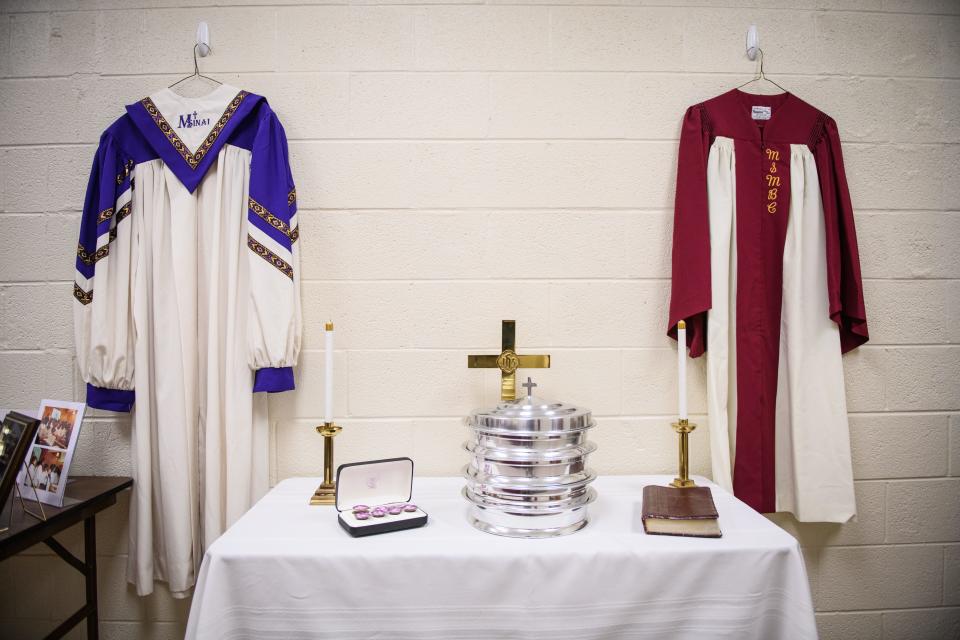
Rollins estimates he and other members of the History Committee handled photos numbering in the thousands.
The pictures were placed on walls in the church’s multipurpose room for the anniversary. But Rollins said they had to be relocated to make way for a display and a public event related to the N.C. History Center on the Civil War, Emancipation & Reconstruction, held Oct. 11.
Founding families
But a visitor to the Mt. Sinai museum would never guess at the scramble that went on behind the scenes. The photographs and memorabilia are neatly arranged on tables and stands, and organized by time period or by church organization. One table is dedicated to the founding families of the church.
A separate room recognizes those members with military service — and there are many, including Rollins' father, who along with his mother, still attends. In another room, the church choirs and pastors are recognized.
Some of the items are past tributes to older church members, with their words preserved for the ages.

One such member, a Sister Annie Lubertha Torrey Campbell, born in 1910 — whose story and image are captured in a framed picture in the museum — said her family moved to Fayetteville in 1922, the year Mt. Sinai was founded, and became among its first members.
She said a pile of lumber down the street was to be a church, according to the account preserved in the museum.
“I began to inquire about it,” she said in the account. “One evening the three Council girls and I went to see where the church was to be erected. I don’t remember how long it took to finish the church.”
She does remember that her grandmother, Annie Torrey, bought the first 100 bricks and her mother, Lena Torrey, bought the first Bible for the pulpit.
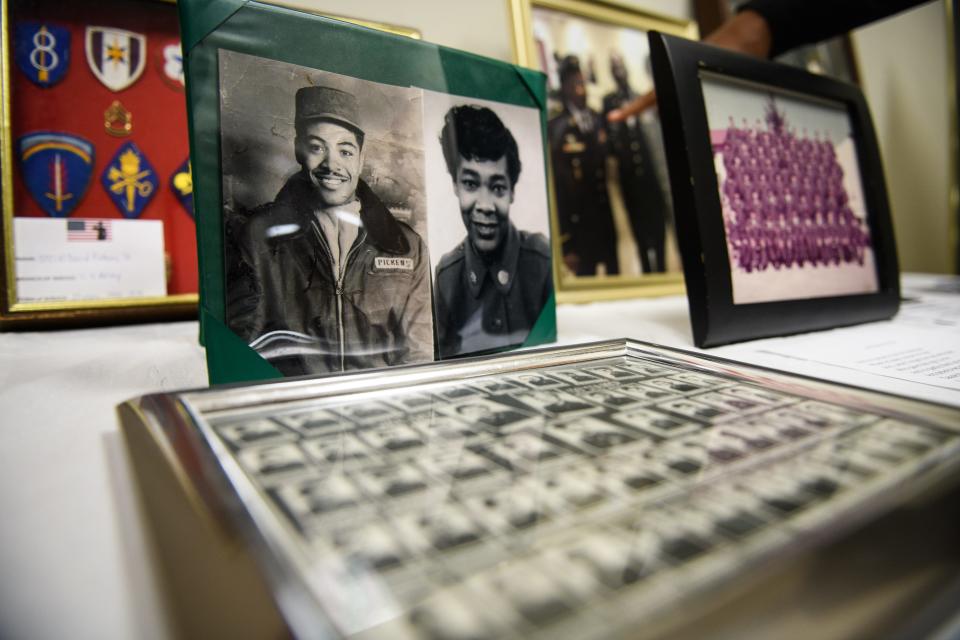
A role in civil rights, politics
During the 1960s civil rights movement, FSU students who participated in sit-ins in downtown Fayetteville, and who were arrested, would meet at Mt. Sinai to organize, said Aaron J. Johnson, who is 89, and is now pastor emeritus.
“I could see it in my mind when the students would leave Mt. Sinai to go downtown to protest,” he said. “They would march down Murchison Road. And that always was a sight to see.”
The retired pastor grew up in Pender County. Months before he was born, a Black man was lynched — and he heard about the crime all doing his growing up. Seeing the young people march for change meant a lot to him, he said.
“What moved me, these students — they wanted a new way to break the backbone of Jim Crow here in Fayetteville,” he said.
Several items in the exhibit remind visitors of the church’s historical connection to civil rights, social activism and politics.
Johnson himself served on the Fayetteville City Council in the 1970s, and newspaper clippings about his service are posted in the museum.
Rep. Mary McAllister, another Mt. Sinai member and a pioneer in state politics, is shown with civil rights icon Rosa Parks. McAllister died in 2020. She is survived by her husband, Freddie, who himself is a former, longtime Mt. Sinai member.
Rollins says Mary McAllister was his own mother's supervisor at Operation Sickle Cell (now Community Health Interventions)
"She used to play the piano," he says of McAllister. "She was very active here in our church."
Rollins said the story is passed down to him that late Mayor Beth Finch challenged church leadership when they were engaged in civil rights efforts to make use of nearby land to help the community; the church turned it into low-income housing, the Mt. Sinai Homes, with 100 apartments. Initial efforts for the homes received a boost from a seemingly unlikely source: conservative firebrand U.S. Sen. Jesse Helms.
There is also a picture in the museum that shows Aaron Johnson meeting President Ronald Reagan at the White House.
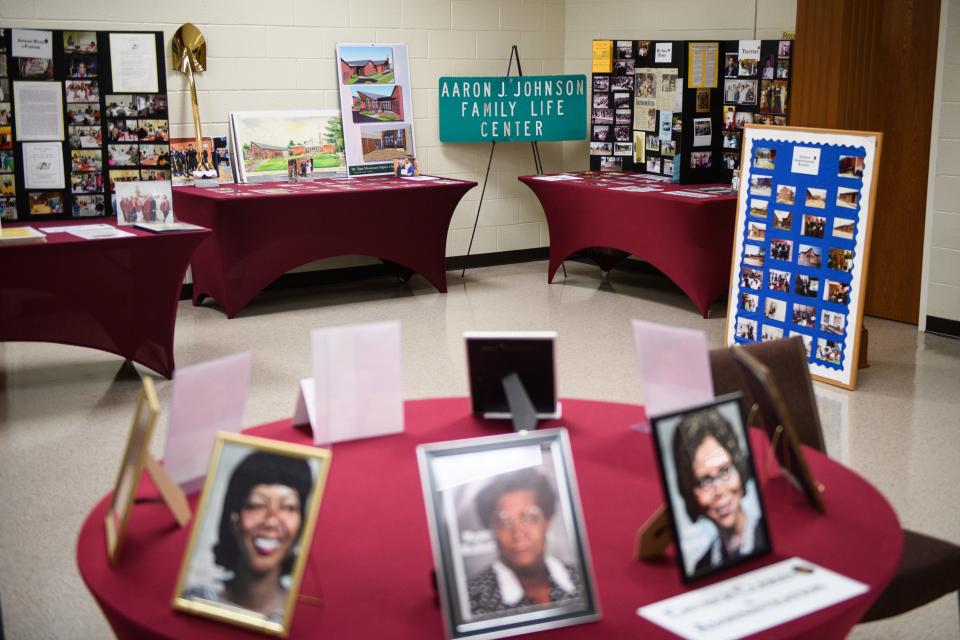
Love and fellowship
But the bulk of the exhibit shows the life of the church — decades of love and fellowship captured in many different ways from baptisms to Graduation Sunday, where high school and college graduates are recognized.
Rollins points out one of the dinner menus from when the Family Life Center was serving a repast better than any restaurant in the city, or county.
“My favorite place,” he says with a smile.
It was under the direction of one Mrs. Mary Lewis and her Million Dollar Poundcake.
“That was her territory,” he said. And: “KFC didn’t have nothing on her fried chicken.”
Familiar faces
The 100th-anniversary event in late July brought back many familiar faces from the past to join the congregation who worship there on regular Sundays.
The event spread over three days. There was registration, with gift bags, and a talent show on Friday. On Saturday, there was a picnic on church grounds, a tour of the museum and fellowship among people who had not seen each other in some cases for years.
“There were a lot of people telling of their experience at Mt. Sinai,” Pastor Jamale Johnson said. “That was a day full of connecting. Just a fun-filled day.”
Because of concerns over COVID-19, the Sunday service was held at E.E. Smith High School’s auditorium. There was an historical connection to the school’s namesake: Dr. Ezekiel Ezra Smith sold the land to the Woods family that would became the location of the church, Johnson said.
More than 500 people came out, said Johnson, whose wife is Kim R. Johnson.
Rollins sang in an anniversary choir comprising people who sang together as children. It was an emotional moment, he noted, for many, including Aaron J. Johnson and Mattie Johnson, his wife.
The elder Johnson said he was happy to see adults whom he had Baptized when they were in the Children’s Church. Mt. Sinai is not just a church, but a family, he said, and the former youth of the church still acted like brothers and sisters.
Johnson cannot walk without assistance these days but he said he could hardly stay in his chair when he saw them singing, and “still holding onto the values and faith in the Lord.”
“That was overwhelming,” he said.
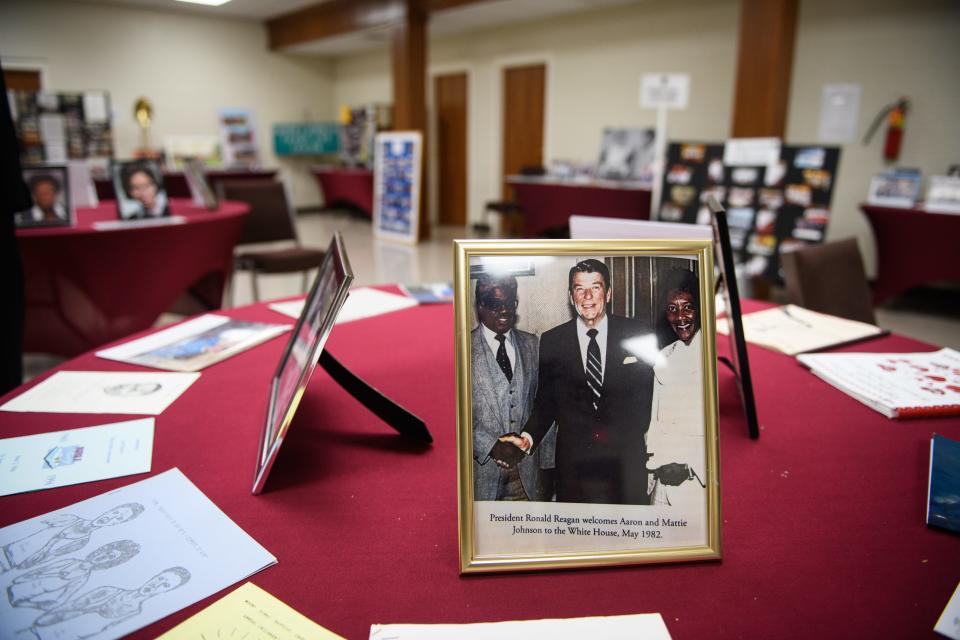
Looking to the future, Rollins and some of the other young adults want to find a way to connect with FSU students like Deacon McNeill did back in the day. He adds with a chuckle that he is knocking on the door of 40 and is maybe not so young anymore.
But he is definitely young compared to the elders in his church. And some in that generation have gone on to glory — seven in a relatively short time span, he said.
But all of them have their proper place in the Mt. Sinai museum.
Rollins, who owns a video and social media business, said the plan was to run the museum and gallery to the end of the year but he sounds doubtful — it may run longer, as it has been so well-received.
He said that his strong connection to the older folks and their stories may stem from the fact that his grandparents had passed by the time he first came to Mt. Sinai at the age of 5. He talks reverently about current members such as Archie Williams, who he considers the church historian, and people like Willie Lewis, a 91-year-old veteran; and Faye Fulton.
"She was my Sunday school teacher, and my fifth-grade teacher and taught my brother and sister at Montclair Elementary," he said.
As for the museum, it is not just a jog down memory lane for Mt. Sinai members. Rollins said he has seen the excited reaction of people from sister churches, like Friendship Missionary Baptist and Mt. Olive Missionary Baptist.
“They have come and supported our museum,” he said. “A lot of them, they saw people in this museum that they grew up with.
“One lady she just freaked out. She was just like, ‘She used to do my hair!’
“But it’s kind of good that they see people they remember.”
Myron B. Pitts can be reached at mpitts@fayobserver.com or 910-486-3559.
This article originally appeared on The Fayetteville Observer: Mount Sinai in Fayetteville celebrates 100 years in 2022

